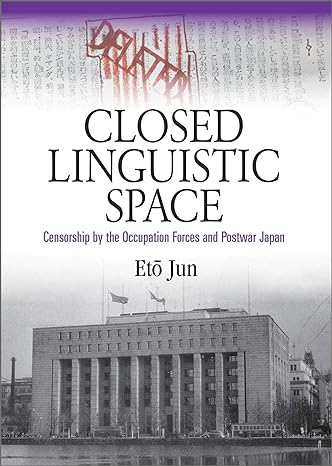
Closed Linguistic Space : Censorship By The Occupation Forces And Postwar Japan
Penyensoran / Perang Dunia, 1939 - 1945
Jenis Bahan
Monograf
Judul Alternatif
-
Pengarang
Jun, Eto (Pengarang) ; The Japan Institute of International Affairs (JIIA) (Penerjemah)
Edisi
Edisi Pertama Bahasa Inggris
Pernyataan Seri
-
Penerbitan
Tokyo : Japan Publishing Industry Foundation for Culture (JPIC), 2020; © 1989, 1994 Fukawa Noriko
Bahasa
Inggris
Deskripsi Fisik
239 Halaman ; 22 cm.
Jenis Isi
Teks
Jenis Media
Tanpa Perantara
Penyimpanan Media
Volume
ISBN
9784866581149
ISSN
-
ISMN
-
Bentuk Karya
-
Target Pembaca
Umum
Catatan
-
Abstrak
The United States postwar occupation of Japan likes to boast of having given the Japanese freedom of expression and freedom of the press. True, it freed the Japanese press from many wartime constraints. But at the same time, it imposed a large number of new constraints, replacing wartime censorship by the Japanese government with postwar censorship by the American occupation authority. Even before the war ended, planning for the occupation included a censorship and public relations efforts that would work to “re-educate” the Japanese and fold them into the postwar American international order. Similar efforts were made in Germany, but the effort in Japan was far more sweeping and far more sustained. This book documents that history in detail with extensive reference to primary resources held in U.S. archives and elsewhere. Was the occupation successful in reshaping the Japanese mindset? Citing not only the postwar Constitution but also, among other things, the widespread belief in the Tokyo Trials’ validity, Eto argues doggedly that it was so successful that its pernicious influence persists even today. Yet the heart of this heavily researched book is its meticulous documentation of how this censorship was planned and enforced.
| No. Barcode | No. Panggil | Lokasi Perpustakaan | Lokasi Ruangan | Kategori | Akses | Ketersediaan |
|---|---|---|---|---|---|---|
| 00006153991 | R/363.31 JUN c |
Perpustakaan Jakarta - Cikini Jln. Cikini Raya No. 73, Komplek Taman Ismail marzuki, Jakarta Pusat |
Cikini Umum - Lantai 4 dan Lantai 5 | INTERNATIONAL | Baca di tempat | Tersedia |
| 00006153995 | R/363.31 JUN c |
Perpustakaan Jakarta - Cikini Jln. Cikini Raya No. 73, Komplek Taman Ismail marzuki, Jakarta Pusat |
Cikini Umum - Lantai 4 dan Lantai 5 | INTERNATIONAL | Baca di tempat | Tersedia |
| No. | Nama File | Nama File Format Flash | Format File | Aksi |
|---|---|---|---|---|
| Tidak ada data. | ||||
| Tag | Ind1 | Ind2 | Isi |
|---|---|---|---|
| 001 | INLIS000000000850048 | ||
| 005 | 20231211043136 | ||
| 006 | a####g############ | ||
| 007 | ta | ||
| 008 | 231211t###############g############eng## | ||
| 020 | # | # | $a 9784866581149 |
| 035 | # | # | $a 0010-1223000283 |
| 040 | # | # | $a JKPDJAK$b ind$c rda |
| 041 | 1 | # | $a eng |
| 082 | 0 | 4 | $a 363.31$2 [23] |
| 084 | # | # | $a R/363.31 JUN c |
| 100 | 1 | # | $a Jun, Eto$e Pengarang$e Jun, Eto$e Pengarang |
| 245 | 1 | 0 | $a Closed linguistic space : $b censorship by the occupation forces and postwar Japan /$c Eto Jun ; Penerjemah, The Japan Institute of International Affairs (JIIA) |
| 250 | $a Edisi Pertama Bahasa Inggris | ||
| 264 | # | 1 | $a Tokyo :$b Japan Publishing Industry Foundation for Culture (JPIC),$c 2020 |
| 264 | # | 4 | $a © 1989, 1994 Fukawa Noriko |
| 300 | # | # | $a 239 Halaman ; $c 22 cm. |
| 336 | # | # | $a Teks$2 rdacontent |
| 337 | # | # | $a Tanpa Perantara$2 rdamedia |
| 338 | # | # | $a Volume$2 rdacarrier |
| 520 | # | # | $a The United States postwar occupation of Japan likes to boast of having given the Japanese freedom of expression and freedom of the press. True, it freed the Japanese press from many wartime constraints. But at the same time, it imposed a large number of new constraints, replacing wartime censorship by the Japanese government with postwar censorship by the American occupation authority. Even before the war ended, planning for the occupation included a censorship and public relations efforts that would work to “re-educate” the Japanese and fold them into the postwar American international order. Similar efforts were made in Germany, but the effort in Japan was far more sweeping and far more sustained. This book documents that history in detail with extensive reference to primary resources held in U.S. archives and elsewhere. Was the occupation successful in reshaping the Japanese mindset? Citing not only the postwar Constitution but also, among other things, the widespread belief in the Tokyo Trials’ validity, Eto argues doggedly that it was so successful that its pernicious influence persists even today. Yet the heart of this heavily researched book is its meticulous documentation of how this censorship was planned and enforced. |
| 650 | # | 4 | $a Penyensoran |
| 650 | # | 4 | $a Perang Dunia, 1939 - 1945 |
| 710 | 2 | # | $a The Japan Institute of International Affairs (JIIA)$e Penerjemah |
| 740 | # | # | $a Tozasareta gengokukan: senryogun no ken 'etsu to sengo Nihon |
| 850 | # | # | $a JKPDJAK |
| 990 | # | # | $a D027861/23 |
| 990 | # | # | $a D027862/23 |